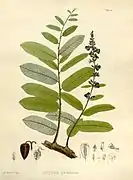Qualea parviflora
Qualea parviflora, known as pau-terra in Portuguese, is a deciduous tree indigenous to Bolivia, Brazil, and Paraguay.[2] The tree favors dry climates like the tropical savanna of the cerrado.[3][4][5]
| Qualea parviflora | |
|---|---|
.jpg.webp) | |
| Scientific classification | |
| Kingdom: | Plantae |
| Clade: | Tracheophytes |
| Clade: | Angiosperms |
| Clade: | Eudicots |
| Clade: | Rosids |
| Order: | Myrtales |
| Family: | Vochysiaceae |
| Genus: | Qualea |
| Species: | Q. parviflora |
| Binomial name | |
| Qualea parviflora | |
Description
Qualea parviflora grows up to 8 m (26 ft) tall. It flowers between September and December. Each flower as one light purple petal, a single stamen, a spurred calyx, and a three-parted ovary. Pau-terra can be distinguished from a close relative Qualea multiflora by its smaller flowers.[6]
 Illustration from Karl Friedrich Philipp von Martius's Nova genera et species plantarum
Illustration from Karl Friedrich Philipp von Martius's Nova genera et species plantarum
Ecology
The flowers are pollinated by bees.[6] The seeds are eaten by buprestid beetles and small Hymenoptera species.[6] Caterpillars of the dalcerid moth Dalcera abrasa feed on Quaela parviflora.[7]
References
- Martius, Karl Friedrich Philipp von (1824). "Qualea parviflora". Nova genera et species plantarum :quas in itinere per Brasiliam MDCCCXVII-MDCCCXX jussu et auspiciis Maximiliani Josephi I., Bavariae regis augustissimi instituto / (in Latin). Impensis Auctoris. pp. 135–136.
- "Qualea parviflora Mart". Plants of the World Online. Royal Botanical Gardens Kew. Retrieved 4 August 2019.
- Gonçalves-Alvim, SJ; Collevatti, RG; Fernandes, GW (August 2004). "Effects of genetic variability and habitat of Qualea parviflora (Vochysiaceae) on herbivory by free-feeding and gall-forming insects". Annals of Botany. 94 (2): 259–68. doi:10.1093/aob/mch136. PMC 4242161. PMID 15234928.
- Heckman, Charles W. (1998). The Pantanal of Poconé: Biota and Ecology in the Northern Section of the World’s Largest Pristine Wetland. Springer Science & Business Media. ISBN 9780792348634.
- Lorenzi, Harri; Flora, Instituto Plantarum de Estudos da (2002). Brazilian Trees: 4th ed. Instituto Plantarum de Estudos da Flora. p. 365. ISBN 9788586714177.
- Custódio, Luciana Nascimento; Carmo-Oliveira, Renata; Mendes-Rodrigues, Clesnan; Oliveira, Paulo Eugênio (September 2014). "Pre-dispersal seed predation and abortion in species of Callisthene and Qualea (Vochysiaceae) in a Neotropical savanna". Acta Botanica Brasilica. 28 (3): 309–320. doi:10.1590/0102-33062014abb3064.
- "HOSTS - The Hostplants and Caterpillars Database at the Natural History Museum". www.nhm.ac.uk. Retrieved 4 August 2019.
This article is issued from Wikipedia. The text is licensed under Creative Commons - Attribution - Sharealike. Additional terms may apply for the media files.